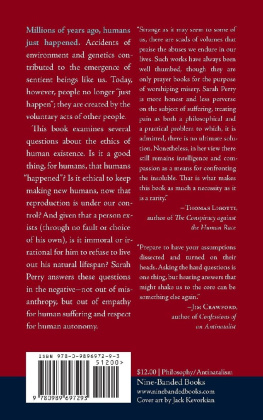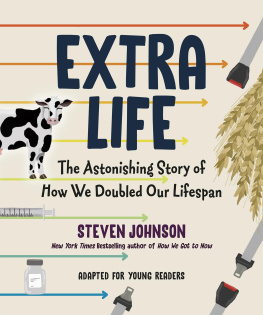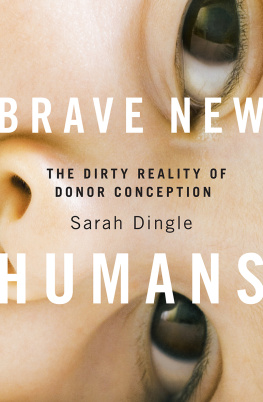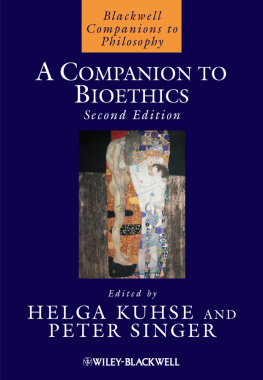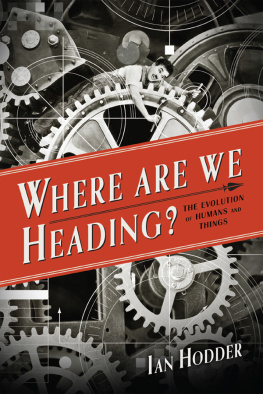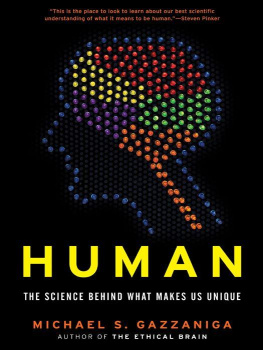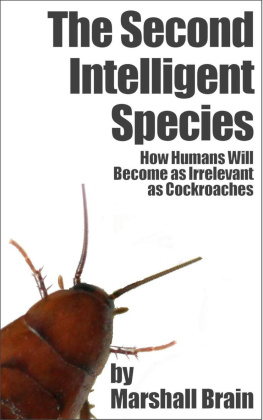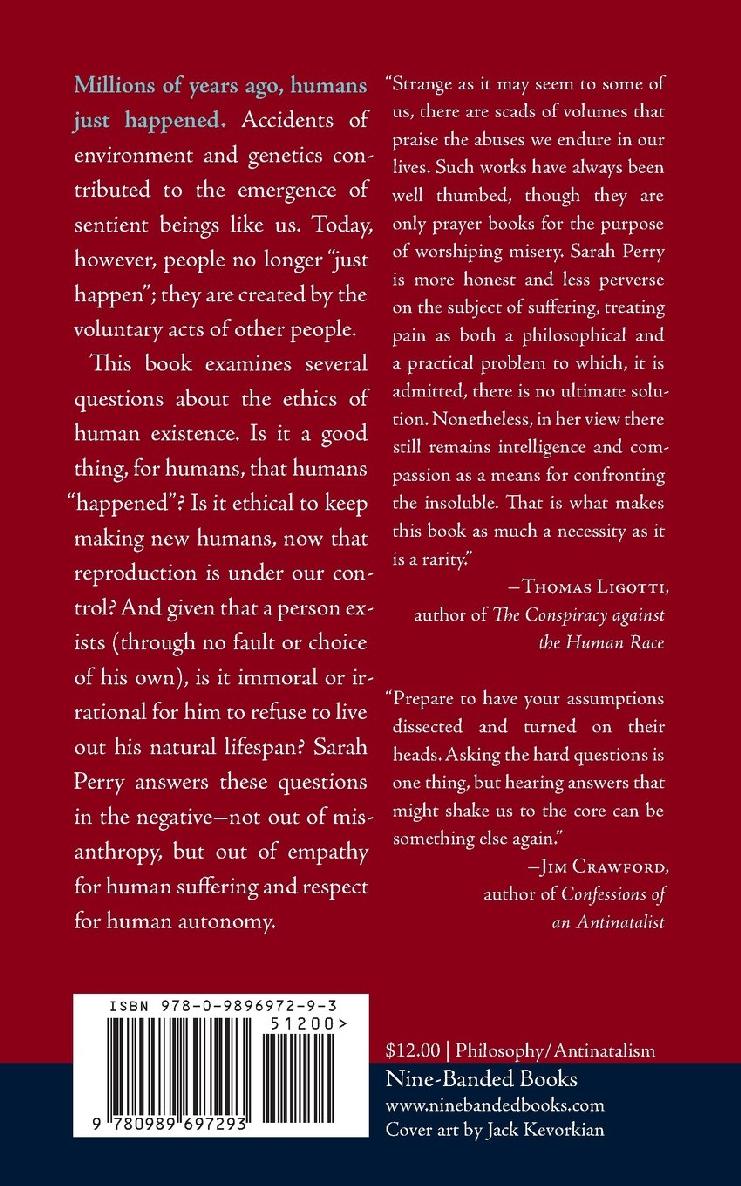
Every Cradle Is A Grave
Rethinking the Ethics of Birth and Suicide
Sarah Perry
Copyright 2014
Published by Nine-Banded Books, PO Box 1862, Charleston, WV 25327, USA
NineBandedBooks.com
ISBN-10: 0989697290
ISBN-13: 978-0989697293
Cover painting: Very Still Life by Dr. Jack Kevorkian (19282011)
Cover design by Kevin I. Slaughter
Table of Contents
For Dread Pirate Roberts
Preface
This is a book about ethics. People dont often change their minds about ethics. When they do, it is generally for social reasons, not because they are exposed to reasoned argument. Reasoned arguments more often allow people to cement their existing opinions. Ethical beliefs are, in any case, extremely limited in their ability to influence actions.
I will advocate several ethical positions that are counterintuitive, and that some people would describe as evil. These ethical positions include the view that lifenot just human life, but all life capable of having experiencesis very bad. It is very immoral, I will argue, to have babies or to otherwise create aware beings. I will also argue that suicide is not wrong or a product of mental illness, but an ethically privileged, rational response to the badness of life.
You might imagine these to be positions held by a comic book villain bent on destroying all life in the universe for its own good. Thats fine with me. In fact, its a good place to start. Because in presenting what I hope is a reasoned and factually supported ethical argument advocating such extreme ideas, I do not expect to persuade. It is more likely that I will be mentally categorized by the reader as such a cartoon villain (assuming the reader is not one of those few to whom these cartoon villain ideas seem obviously right). And to the extent that the reader holds contrary, prolife, anti-suicide beliefs, I understand that exposure to my unorthodox views may only reinforce those beliefs.
Believe it or not, that seems pretty rational to me. To respond to crazy-sounding out-group beliefs with increased faith in the in-group beliefs validated by known and trusted authorityis a smart strategy. From the trenches of interpersonal communication, I dont think ad hominem is even much of a fallacy. On the contrary, consciousnessand all knowledgeis social in nature; and most of our knowledge comes not from direct experience or through reasoning, but from trusted sources. Though some of our beliefs about the physical world come from direct experience, we mostly rely on the trusted testimony of teachers, scientists, and friends to understand such things that we have no direct experience of, or of which our direct experience is understood to be limited or mistaken. The Earth appears to be flat, and the sun, which looks like it is smaller than the Earth, appears to be moving around the earth. We know better only because we are reliably advised that our initial sensory impressions are incorrect. In a similar way, we get some of our ethical beliefs from direct intuitive perception, but we also rely on the ethical beliefs of those around us to shape our own beliefs and actions. We are much more likely to be vegetarians if our friends are vegetarians. We are much less likely to support gun control if our friends are gun enthusiasts.
Many readers will find it natural to think of the self as the ultimate arbiter of ethical questions, but this is based on a modern and distinctly Western conception of the self. And even self-heavy moderns will sometimes admit to confusion as to what is the right thing to do in a morally unclear situation. Who, then, is to be consulted and trusted on issues of moral relevance? And what should be the result if one disagrees with a trusted friend on a moral matter?
There are some peoplecrazy people, evil people, people who have taken large amounts of methamphetamines for days on endwhose disagreements with our opinions on ethical matters would not cause us to have any doubts as to the correctness of our own opinions (possibly the opposite, as noted above). But any socially well-adjusted human being is likely from time to time to encounter a person whose contrary opinions are less easily dismissed. When we engage with such a personwho is so trusted, whose mental apparatus has been so verified to work well, and whose motives are so clearly earnestwe may come away less certain about the correctness of our own views. I like the term epistemic peer for a person so trusted, brain-wise and team-wise, that his opinion will be taken very seriously when it disagrees with our own.
I am more interested in establishing myself as an epistemic peer of the reader than in autistically presenting a logical argument for the correctness of my views. When you find yourself coming to an unusual conclusion and you cant find a flaw in your own reasoning, the epistemically proper path, I think, is to show your brain and show your work. You display the way your mind (your laboratory apparatus) approaches the problem, and you present your argument (your laboratory protocol) in a clear way so that others may examine it.
As I would rather participate in social reasoning than table-pound in my corner, I will not only present the extreme forms of my arguments (many of which I think are correct); I will also attempt to present the continuum for each position, many points along which are uncontroversially reasonable. More important, I will show that such continua exist. I consider many people reasonable who do not go full cartoon villain and agree with me that all life is unfortunate and nobody should ever have babies. What makes such people seem reasonable to me is that they recognize the possibility that a given life could go very badly, and that the joys of life might not outweigh the suffering. At the very least, they recognize that the interests of an aware being are very hard to predict before that being is created.
What I would like readers of this book to come away with is not the urge to bomb IVF clinics or dismantle suicide barriers on bridges. I would prefer that readers simply and sincerely consider the question of whether existence is a blessing or a burden, and I hope to encourage the understanding that for many people, it is a useless burden. I would like the reader to think of parenthood as a moral decision affecting a new human being, rather than an event that merely happens to oneself. I would like the reader to consider that it may be both more important and more possible to prevent harm than to do active good in the world. I would like readers to consider the mental states of aware beings as being a very important, if not terminal, locus of ethical value in the universe. Finally, I would like readers to dig further into the nature of their own values, especially the primitive values of survival and longevity. If these points are communicated, I will have done my duty to the late Dr. Jack Kevorkian, who suffered much in his life for the good of others and who, before his death, kindly gave me permission to use one of his paintings on the cover of my book.
The prevailing views on birth and suicide, I will argue, are very misguided. But they are misguided in characteristically human and evolutionarily adaptive ways. In order to reject them, we must approach what David Eubanks has called the Frontier of Occamthe highest intelligence achievable by a civilization before it figures out better ways to achieve its ends than by continuing to pursue the goals of its alien creator, evolution.
I suspect that I have made more converts to the cause of questioning lifes value simply by being an adorable housewife who makes a killer chanterelle risotto than by any particular argument Ive constructed. Since I cant make you risotto, I have tried to present my arguments in a calm and reasoned manner, with abiding respect for the humanity that we all share. Perhaps I will come across as the sort of cartoon villain you should accept as an epistemic peer. But whether or not you allow me to influence you with my dangerous ideas, I hope you will believe me when I tell you that I am very much on your side. You are, after all, an aware being having experiences. This is true whether or not you have had or will have children, and this is true whether you want to live or want to die.
Next page
